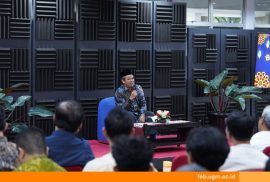The Gadjah Mada International Journal of Business (GamaIJB), managed by the Master in Management Study Program at the Faculty of Economics and Business UGM, has been recognized internationally by achieving a Q3 ranking in Scopus. This milestone confirms the journal’s commitment to promoting high-quality research and high-impact scientific publications.
In an interview with the Editor-in-Chief of GamaIJB, Prof. Amin Wibowo, S.E., M.B.A., Ph.D., insights were shared on how the tri-annual journal continues to innovate and excel in sustaining its achievements.
GamaIJB’s Journey and Transformation
Known initially as Kelola, a national journal, the transition to GamaIJB represented a change in identity and quality. This commitment eventually led to its inclusion in the Q3 tier of Scopus-indexed journals.
“This success is inseparable from the contributions of various parties, including authors, reviewers, professional staff, and editors, who play a crucial role in improving the quality of published articles,” Amin recently stated.
He highlighted several key factors that have significantly improved the quality of published manuscripts. These include authors’ confidence in GamaIJB as a publication outlet, reviewers’ expertise in providing constructive feedback, and the efficiency and professionalism of the staff in processing submissions.
GamaIJB’s achievements have directly enhanced FEB UGM’s reputation in research and scientific publishing. Amin noted that a high-quality journal attracts more excellent articles, increasing citations and visibility. “GamaIJB’s contributions align with the university’s tri-dharma, especially in research. This has made GamaIJB a sought-after outlet for authors while strengthening FEB UGM’s position nationally and internationally,” he noted.
Challenges and Strategies to Maintain Quality
Achieving international journal indexing status was no small feat and required continuous effort. “This is not a one-off achievement but an ongoing commitment. GamaIJB must constantly seek, expand, and improve the quality of the articles it publishes,” Amin emphasized.
The road to this achievement has been fraught with challenges, including improving the quality of manuscripts and moving up the rankings. “The higher the journal’s quality, the more attractive it becomes to authors seeking publication. To achieve the Q2 ranking, GamaIJB must continue to raise its standards to attract the best manuscripts,” he explained.
Another challenge is to ensure professional journal management. Authors expect prompt decisions on their submissions, whether accepted, revised, or rejected. GamaIJB aims to optimize its review process by involving competent reviewers and accelerating the review time without compromising quality to meet this demand.
Regarding accessibility, GamaIJB provides an open-access online format and distributes free print copies to 64 Master of Management programs across Indonesia. This initiative supports wider dissemination of knowledge through both digital and physical formats.
GamaIJB collaborates with other FEB UGM journals, such as the Journal of Indonesian Economy and Business (JIEB) and the Journal of Leadership in Organizations (JLO), to enhance the quality of articles and expand international networks. In addition, publishing experts are regularly invited to serve as editors or advisors to ensure continuous improvement of journal management standards.
Commitment to the SDGs
In support of the Sustainable Development Goals (SDGs) agenda, GamaIJB prioritizes manuscripts relevant to SDG-related issues. Amin noted that focusing on the 17 SDG goals is increasingly essential, as academic journals such as GamaIJB can promote high-impact research on sustainable development.
Amin emphasized that despite this achievement, GamaIJB remains committed to further improving its quality. The journal aims to move up from Q3 to Q2 in the Scopus rankings to become a leading international journal in the near future.
Reporter: Shofi Hawa Anjani
Editor: Kurnia Ekaptiningrum
Sustainable Development Goals







